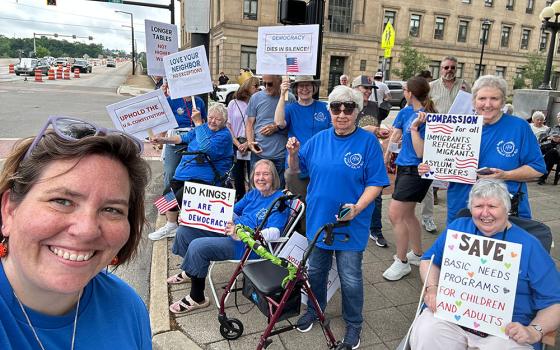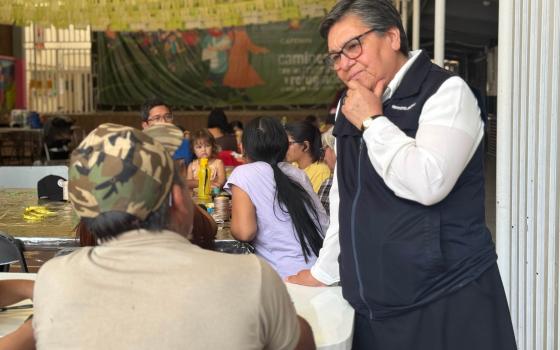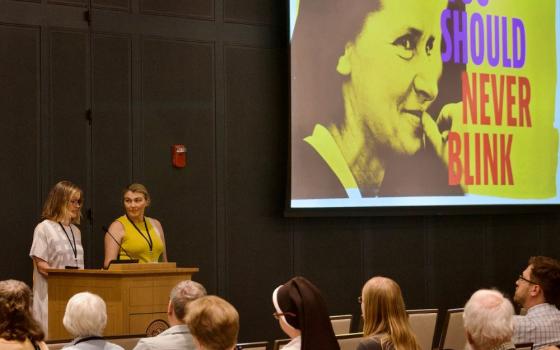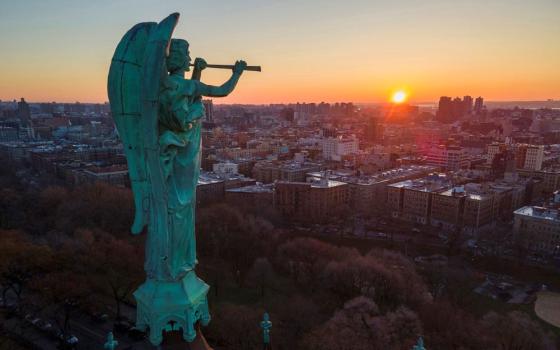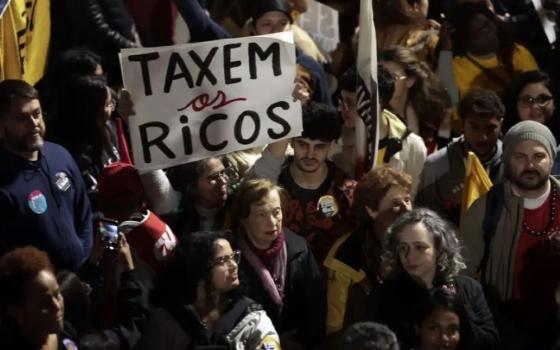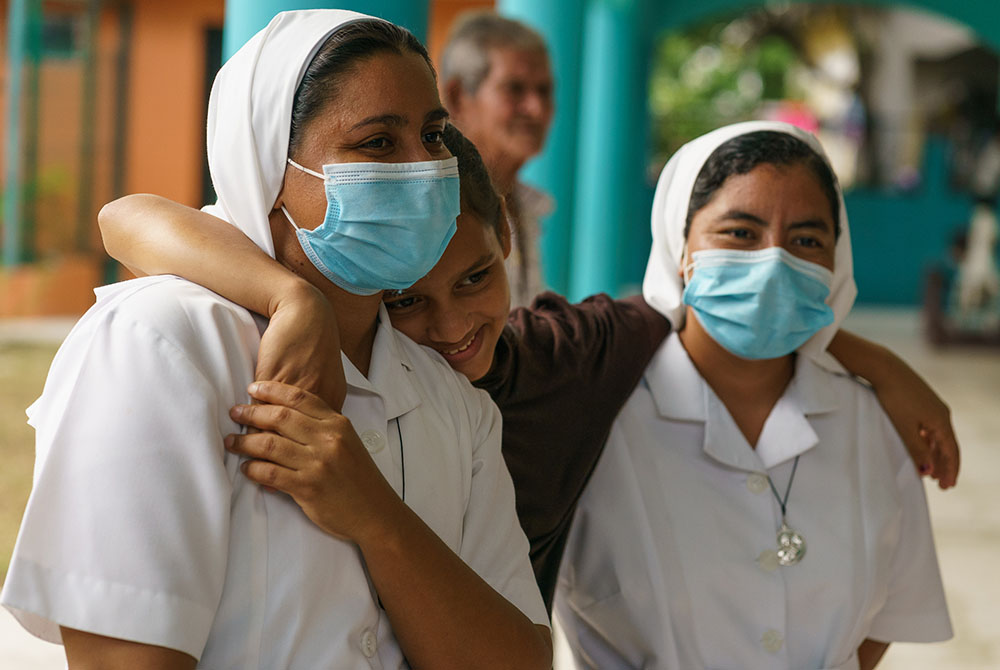
Srs. Jessica Karina Lemus Sánchez and Ana Felipa Olvera Pérez of the Missionaries of Mary Immaculate in Choloma, Honduras, with a young girl whose displaced family is living in the mission's nursery school rooms. (Gregg Brekke)
Editor's note: This story has been updated to include additional information about relief efforts and donations for Honduras.
Although their primary mission is to provide children's services for a fraction of the barrio's approximately 3,000 laborers who work in garment factories, they felt they had no choice but to respond to housing needs as they saw their community suffer in the days following the hurricanes.
Area parishes are involved in relief efforts as well, coordinating with the sisters to assess and provide for the needs of those they have taken in. Mattresses were donated by one congregation. Another group of volunteers from the San Pedro Sula Diocese, under the leadership of Fr. Noel Ortiz, is coordinating food basket and clothing distribution throughout Choloma, supporting the sisters' work, and also managing a shelter for dogs displaced by the flooding to help owners and pets reconnect.
Honduras faces a long recovery after being battered by the back-to-back hurricanes. In this region, stretches of makeshift tents still line the main road more than a week after the storms ended, housing people displaced by the storms. Some of the garment factories, and at least one that employs 30,000 people, have shut down temporarily due to flooding or water damage.
When Hurricane Eta struck this textile manufacturing town in northeast Honduras at the beginning of November, thousands of people living in rough housing in low lying areas were forced out of the homes where most can only afford to rent rooms. Living in temporary shelters constructed along the nearby highway as Hurricane Iota unleashed its torrential rains on the area two weeks later, this already suffering population was left especially devastated.
In Barrio La Primavera, the sisters of the María Inmaculada Nursery School established in 2015 by the Missionaries of Mary Immaculate (a congregation based in Spain, Misioneras de María Inmaculada Siervas de las Obreras), quickly converted classrooms in their modest day care center into a shelter for displaced families. On donated mattresses and blankets, with clothing salvaged as they escaped the rising waters in their dwellings, more than a dozen people now occupy the grounds of the nursery awaiting a hopeful return to their residences.
Srs. María Luisa Canencia Garcia, Jessica Karina Lemus Sánchez, Ana Felipa Olvera Pérez, and Bessy Guadalupe Enamorado Monge live and serve among the people of the community, families who work long hours to earn a meager weekly check in nearby garment factories. They say the barrio is a dangerous place — plagued by gun and gang violence — but the sisters feel safe, having established their presence of care.
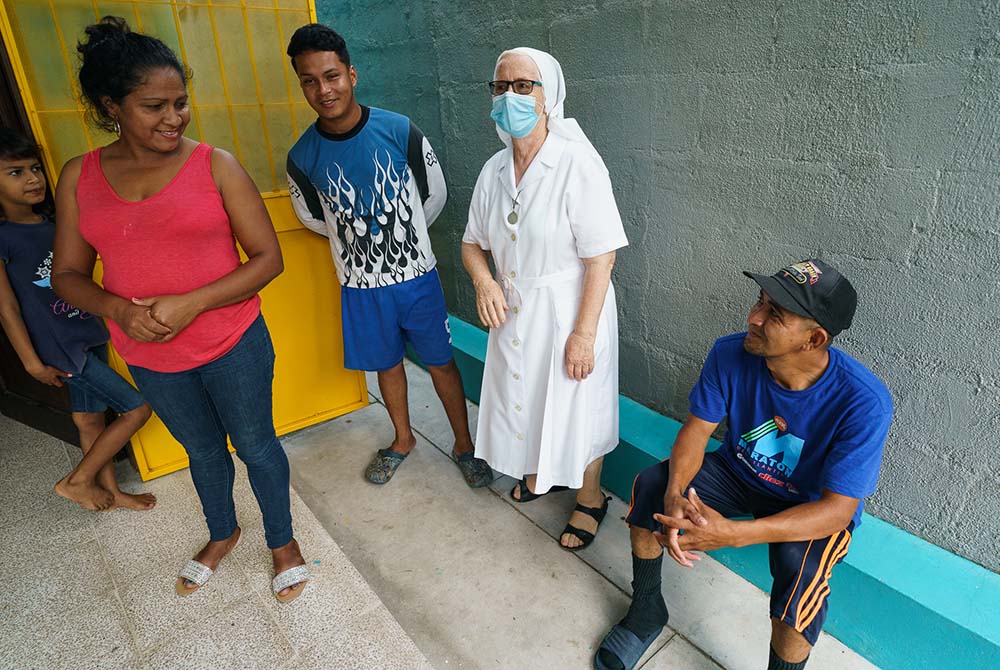
Sr. María Luisa Canencia Garcia of the Missionaries of Mary Immaculate in Choloma, Honduras, is pictured with a family living in the rooms of the mission's nursery school. (Gregg Brekke)
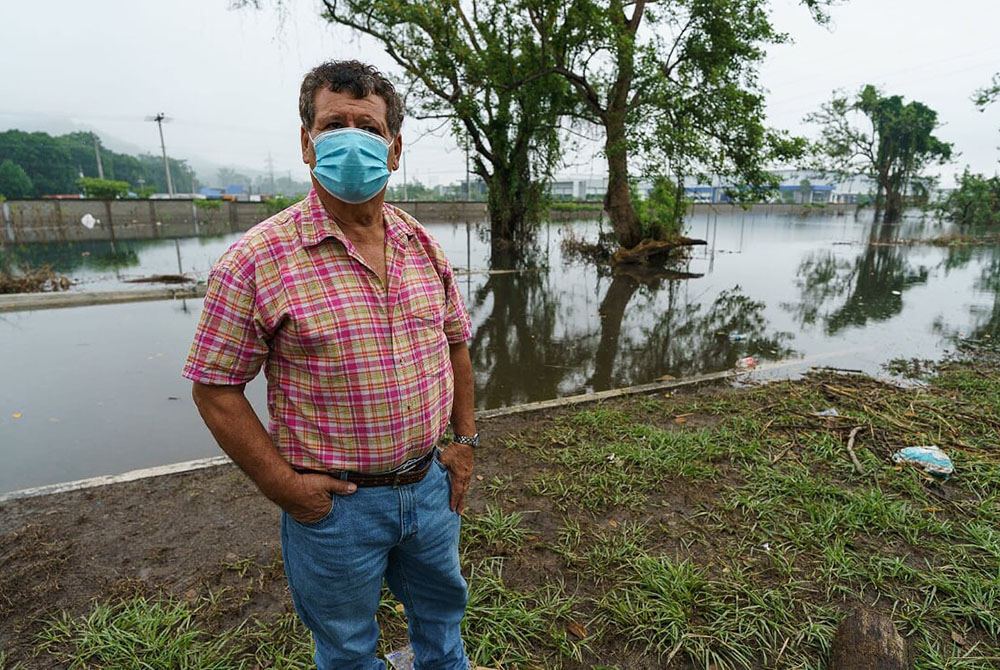
Edilio Bautista Tinoco, a cacao farmer, in the flooded Los Castanos neighborhood of Choloma, Honduras. The garment factory in the background employs 30,000 people. (Gregg Brekke)
The storms that battered Honduras also left trails of destruction in Nicaragua, Guatemala and Panama, say sisters whose congregations minister in the region. "A lot of people have lost everything," said Sr. Larraine Lauter, an Ursuline Sister of Mount St. Joseph and executive lead with Water With Blessings, which empowers women to filter water for their local communities. "People were huddled up under underpasses, in refugee centers or taking refuge in schools — it's a really difficult situation," she said, citing reports from the organization's eight staff people based in Tegucigalpa.
The organization undertook a special campaign to get 5,000 water filters to Honduras in the wake of the storms and is now shipping and setting up distribution, while raising money to cover other hardware and training expenses. "For us, the biggest concern is that after any disaster, the next disaster is contaminated drinking water — there are far more illnesses and casualties because of contaminated water. That's what we know how to do — providing clean water."
The biggest needs are food, potable water and medical supplies, said Sr. Diane Clyne, a Sister of Mercy and director of development for the CCASA community, which serves Mercy Sisters and their ministries in eight countries in the Caribbean, Central America and South America, including Honduras and Panama. Casa Corazon in San Pedro Sula, in which two sisters care for HIV-positive children, had to move all 25 residents, ranging in ages from infants to teens, to other locations before the storms hit.
The residents have since been moved back into the house, which is intact, but the surrounding area is still flooded and choked with mud, said Clyne, who lived for six years in Central America, including at Casa Corazon. People in the neighborhood depended on the sisters for some of their food supply even before the storms, she said, and now are in even greater need.
A man carries his belongings through a flooded road Nov. 18 in Marcovia, Honduras, after the passing of Hurricane Iota. (CNS/Jorge Cabrera, Reuters)
In smaller cities such Tegucigalpita, she has heard from two sisters who live there, that "whole pieces of land with houses just slipped down the mountainside — they have lost a significant number of homes," she said. There is no food supply in that town and with bridges collapsed, it's impossible to get food from neighboring towns, she said. She's been in contact with sisters via WhatsApp and phone. One sister wrote to her said what little recovery is happening is because of " 'people helping people — we don't see the government.' "
In Panama, Clyne has been in contact with two sisters in Panama City who run a women and child care center, but has not been able to reach three sisters ministering to nine villages and other areas in the interior of the country. The area "was badly hit," Clyne said. "We have concern for the sisters and their outreach for the people." With roads and bridges damaged and crops destroyed, the recovery challenge is massive — and there is still the concern of the coronavirus. The need for food and medicine are both for the immediate and extended term, she said. "It's not going to end with one relief mission."
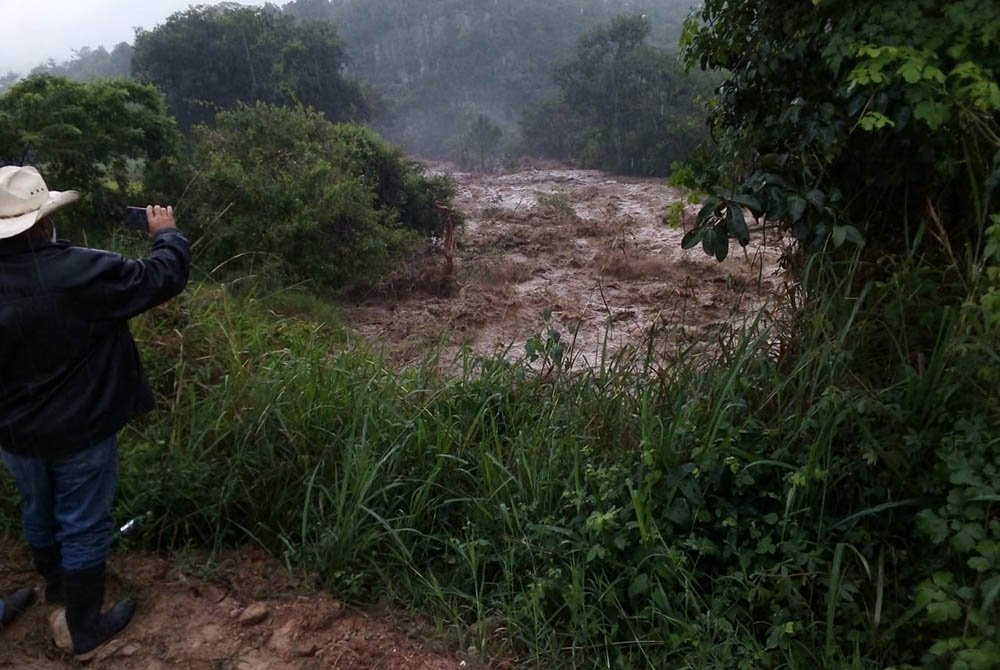
Rivers in southwestern Honduras, where Sr. Pat Farrell, a Sister of St. Francis of Dubuque, Iowa, and others minister, are swollen and muddy because of the torrential rain and mudslides caused by the two hurricanes, Eta and Iota. Pictured is a river near Farrell's house, and a neighbor. The bridge nearby is fortunately still intact but many have washed away. (Sr. Pat Farrell)
Flooding and mudslides affected communities in the southwestern part of Honduras, where Sr. Pat Farrell and three other Sisters of St. Francis of Dubuque, Iowa, usually do pastoral work in prisons, run formation programs and a radio program, and coordinate water purification projects in the departments (states) of Lempira and Copan. (One of the sisters, a novice, is in Dubuque for formation.) After the storms, Farrell and the other two sisters have been coordinating help and connecting people to resources. "In spite of the great poverty in Honduras, the peoples' spontaneous mobilization of solidarity is a typical response and very inspiring," Farrell wrote in an email.
"Every parish has organized to collect food and clothing in response to local emergencies as well as to assist efforts in San Pedro Sula. Money, however, is in very short supply," she said. "Our sisters and associates in the U.S. have responded immediately and very generously in generating economic support which we are in the process of channeling through parishes to areas of the dioceses most seriously affected."
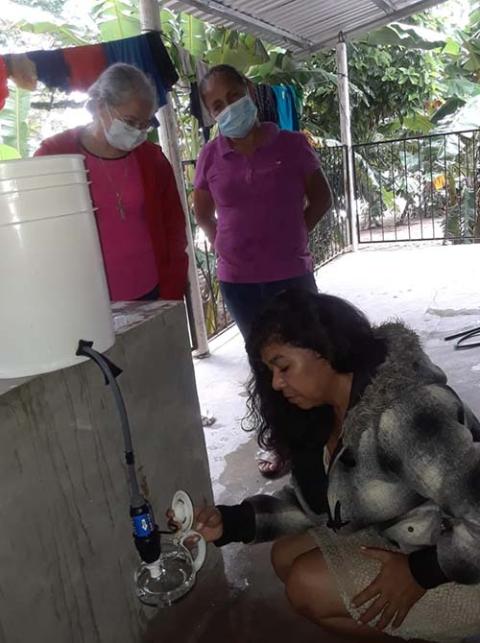
Maria Romero, a Congregation of Notre Dame associate, center, standing, demonstrates how to use a water filtration system to women in a community near Santa Barbara, Honduras, following the hurricanes. Clean drinking water is a priority in the disaster-hit areas. (Courtesy of the Congregation of Notre Dame in Montreal)
She and other sisters are also working to bring safe drinking water to villages. "It is a serious and immediate need." They are focusing on helping those in the countryside, where a number of areas are inaccessible by road, making it challenging to get food and supplies to them. Some people are traveling by foot and horseback to distribution sites. Crops are damaged, which means there will be continued issues with food supply. Building materials such as corrugated tin for roofing will be needed, though repairs rather than rebuilding entire houses will be the priority.
About 20 sisters of the Congregation of Notre Dame in Montreal minister in Honduras, Guatemala and El Salvador, and with associates are helping locals recover from the storms "by doing what they can at this time and the way they can, in the words of St. Marguerite [Bourgeoys], 'going where there is good to be done,' " wrote Sr. Martha Lucía Pérez Gutierrez, region leader, in a newsletter to the congregation.
The sisters' community home in El Progreso, Honduras, was flooded and filled with debris, and they worked with neighbors to clean it up. The sisters and associates, who normally are involved with pastoral ministries, a health and wellness center or educational outreach programs, have been distributing food and water filters.
Sr. Rosa Maria Trochez, a School Sister of Notre Dame, sent a newsletter co-written with Fr. Ismael “Melo” Coto of Radio Progresso summarizing the widespread destruction in Honduras wrought by the storms. Efforts are being made to evacuate those at highest risk and supply water, food, hygiene supplies and masks to prevent the spread of COVID-19. Replanting lost crops and restoring housing are the next priorities. SHARE El Salvador, which assists in El Salvador, Honduras and elsewhere in the region, encouraged those commemorating the 40th anniversary of the murder of the four church women to donate to a hurricane emergency relief fund.
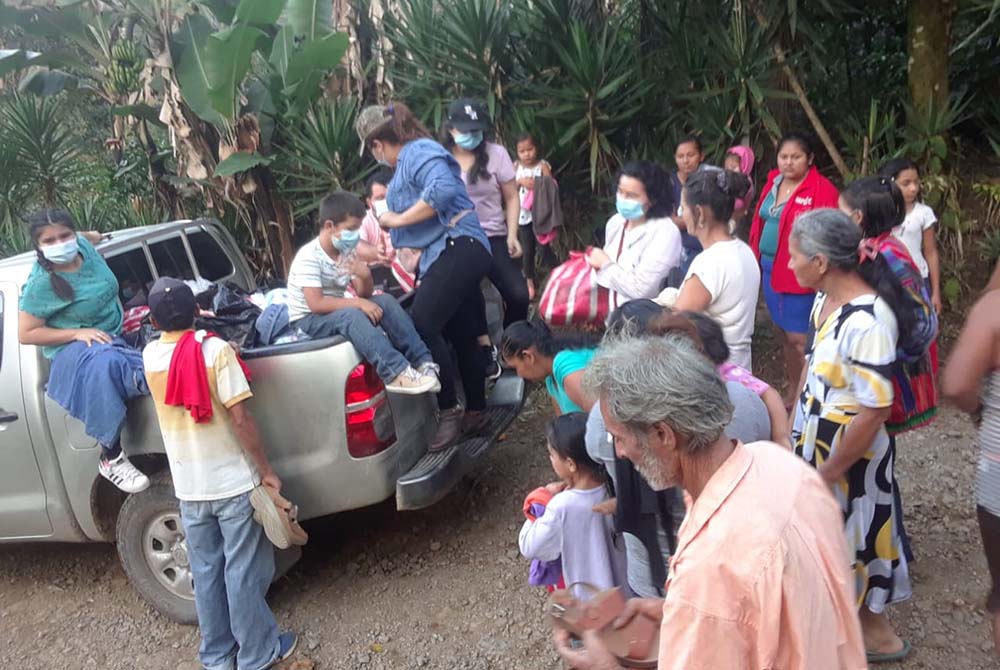
Sisters and associates of the Congregation of Notre Dame have been helping distribute food and supplies in the hurricane-hit area of Santa Barbara, Honduras. Associate Fanny Bonilla, in the blue shirt, and Sr. Lilian Barrera, holding the red bag, are distributing supplies to people of El Zapote, in Santa Bárbara, Honduras. (Courtesy of the Congregation of Notre Dame in Montreal)
The Congregation of Sisters of St. Agnes in Fond du Lac, Wisconsin, has four sisters ministering in Rosita, Nicaragua, and 14 sisters total in the country, the legacy of the congregation's ministry in the country that began 75 years ago. The storms tore off part of the roof of the parish house that the sisters live in (only two of the four were in Rosita during the hurricanes) and the area was badly flooded, said Sr. Kathryn Schilling, who had ministered in Nicaragua for 25 years and still keeps in contact with sisters there. Besides food, clothing and medicine, building materials such as metal sheets for roofs are needed, she said. Many residents are still in staying at schools and haven't yet started rebuilding.
It's not clear how long families will be housed at the María Inmaculada Nursery School in Choloma, Honduras — probably at least a month. But the sisters are committed to helping however they can. The storms' destruction is one more set of challenges in an area where life is already very hard.
"People come to the area because the maquilas (clothing factories) give a weekly payment," said Pérez. "But it's not enough to sustain the families. [The workers] can't even pay for potable water or children's supplies for school. That is why we have the day care — to meet their basic needs, to change their minds away from gangs, to teach them, and also try to motivate them not to quit school."
The sisters' experience of the challenges faced by the working poor in their neighborhood is supported by a 2019 World Bank Jobs Diagnostic report on the Honduran economy. Job creation in the textile and garment sector outpaced all other industries in the past three years by 400%, yet the extreme poverty rate among the general population was the highest in Latin American countries at 16%.
Advertisement
Thirty-five children from ages 2 to 5 are usually on site for regular care at the center. They receive two healthy meals, preschool education, and many loving reminders from the sisters of their value as children. Very few homes have running water, so the children bathe at the center. The lack of access to hygiene contributes to the spread of digestive diseases, Sanchez said.
Garcia, who has served in the order for 53 years and moved to the community from Spain in 2017, explains her hope to remodel a room in the sisters' home to be used exclusively for providing basic health care for the children. With no nearby clinic attending to measure benchmarks of early child development, activities such as monitoring temperatures, weight and height; caring for wounds, nutritional assessments, and administering scheduled medicines are especially important.
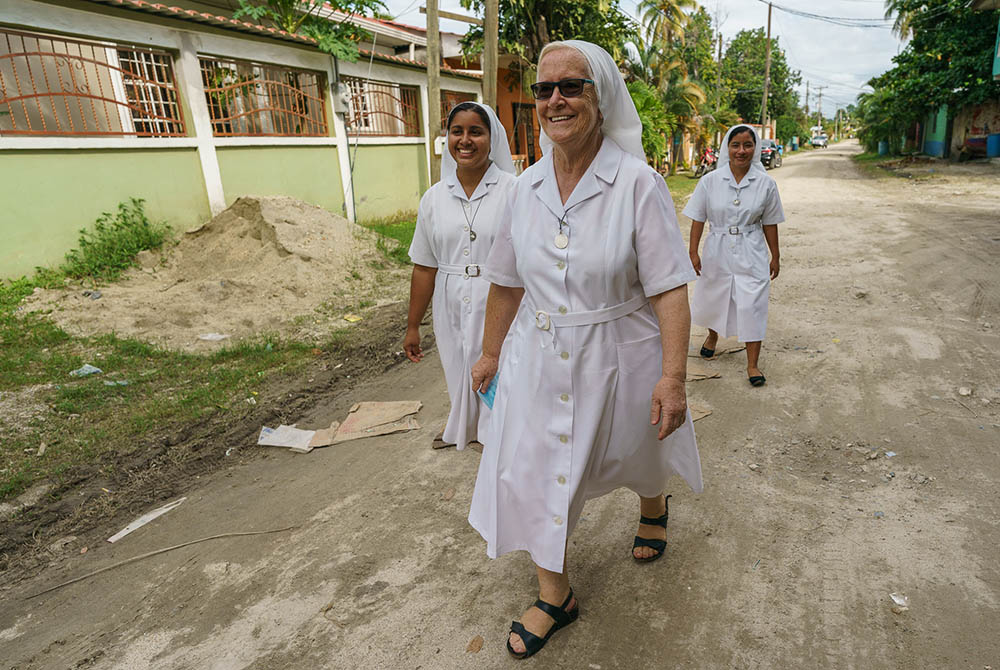
Srs. Jessica Karina Lemus Sánchez, María Luisa Canencia Garcia, and Ana Felipa Olvera Pérez walk through the streets of Barrio La Primavera where they live and serve the children of families who work in the clothing factories of Choloma, Honduras. (Gregg Brekke)
Their small group has cross-trained in each other's areas — health, education and administration — to be able to cover for one another in times of absence. Following the hurricanes, Sister Monge went to her family, whose home about 40 miles away had been severely damaged. Her presence is missed, but Garcia said she and the other sisters have continued their work effectively, in part due to the model of cross-training.
Though the work is difficult, and the children face many challenges in this community of low wage laborers, each of the sisters expresses hope in their calling to live and serve in Barrio La Primavera. Pérez is especially hopeful in the progress the children show in their care.
Garcia agreed, saying she derives hope in seeing the care and stability provided by the sisters sowing benefits in children of all ages. "They are different now from the first day they came to the center — we see the results," she said. "And those results give me hope that we are doing something positive, that it's working for us to be with the children. It gives us strength, even with the younger children, to see how they work with us and grow and learn — that gives us hope so we can continue."
[Gregg Brekke is an award-winning photojournalist and writer dedicated to telling stories of justice and faith. Global Sisters Report Editor Gail DeGeorge contributed to this article.]

